The AMD Ryzen Threadripper 3960X and 3970X Review: 24 and 32 Cores on 7nm
by Dr. Ian Cutress, Andrei Frumusanu & Gavin Bonshor on November 25, 2019 9:05 AM ESTCPU Performance: Encoding Tests
With the rise of streaming, vlogs, and video content as a whole, encoding and transcoding tests are becoming ever more important. Not only are more home users and gamers needing to convert video files into something more manageable, for streaming or archival purposes, but the servers that manage the output also manage around data and log files with compression and decompression. Our encoding tasks are focused around these important scenarios, with input from the community for the best implementation of real-world testing.
All of our benchmark results can also be found in our benchmark engine, Bench.
Handbrake 1.1.0: Streaming and Archival Video Transcoding
A popular open source tool, Handbrake is the anything-to-anything video conversion software that a number of people use as a reference point. The danger is always on version numbers and optimization, for example the latest versions of the software can take advantage of AVX-512 and OpenCL to accelerate certain types of transcoding and algorithms. The version we use here is a pure CPU play, with common transcoding variations.
We have split Handbrake up into several tests, using a Logitech C920 1080p60 native webcam recording (essentially a streamer recording), and convert them into two types of streaming formats and one for archival. The output settings used are:
- 720p60 at 6000 kbps constant bit rate, fast setting, high profile
- 1080p60 at 3500 kbps constant bit rate, faster setting, main profile
- 1080p60 HEVC at 3500 kbps variable bit rate, fast setting, main profile
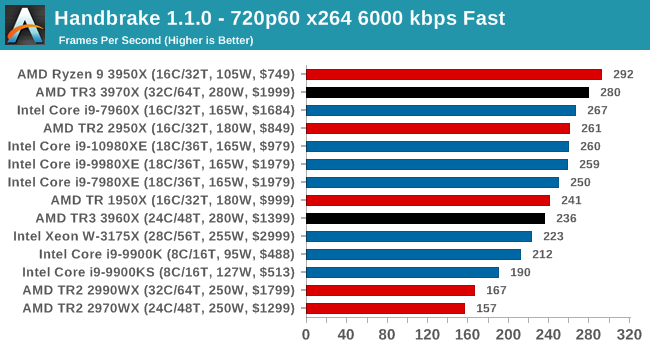
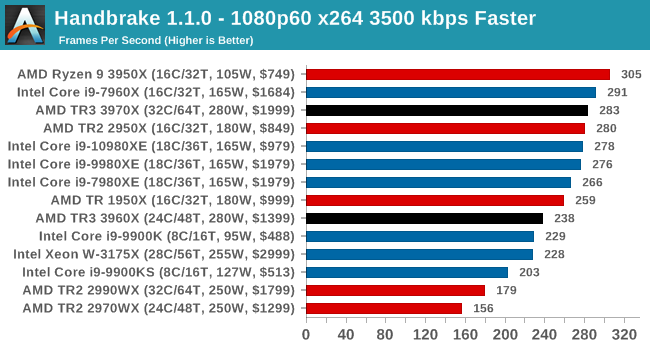
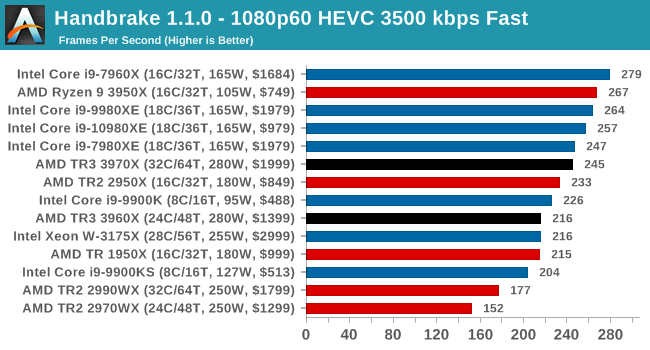
Video encoding is a little varied, based on the variable threaded nature. Certain encoding tests can be more memory sensitive here, or accelerated in different ways, or not scale well with more cores. Either way, TR3 performs a lot better than TR2, but the 3950X seems the best choice.
7-zip v1805: Popular Open-Source Encoding Engine
Out of our compression/decompression tool tests, 7-zip is the most requested and comes with a built-in benchmark. For our test suite, we’ve pulled the latest version of the software and we run the benchmark from the command line, reporting the compression, decompression, and a combined score.
It is noted in this benchmark that the latest multi-die processors have very bi-modal performance between compression and decompression, performing well in one and badly in the other. There are also discussions around how the Windows Scheduler is implementing every thread. As we get more results, it will be interesting to see how this plays out.
Please note, if you plan to share out the Compression graph, please include the Decompression one. Otherwise you’re only presenting half a picture.
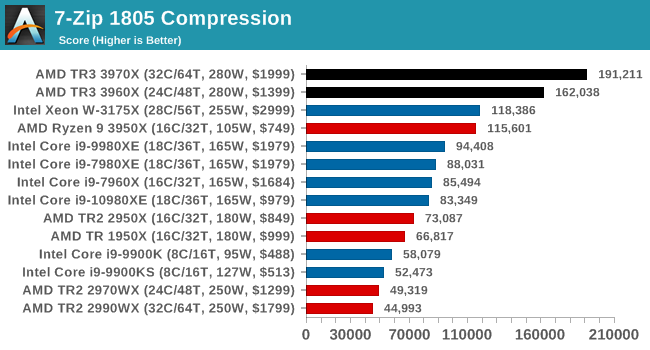
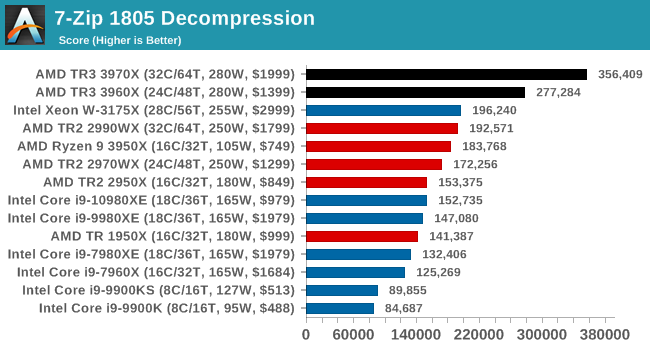
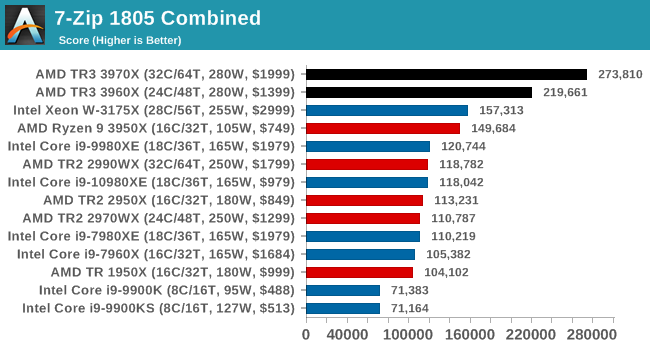
Easily parallel puts the TR3 well ahead of TR2 and Intel.
WinRAR 5.60b3: Archiving Tool
My compression tool of choice is often WinRAR, having been one of the first tools a number of my generation used over two decades ago. The interface has not changed much, although the integration with Windows right click commands is always a plus. It has no in-built test, so we run a compression over a set directory containing over thirty 60-second video files and 2000 small web-based files at a normal compression rate.
WinRAR is variable threaded but also susceptible to caching, so in our test we run it 10 times and take the average of the last five, leaving the test purely for raw CPU compute performance.
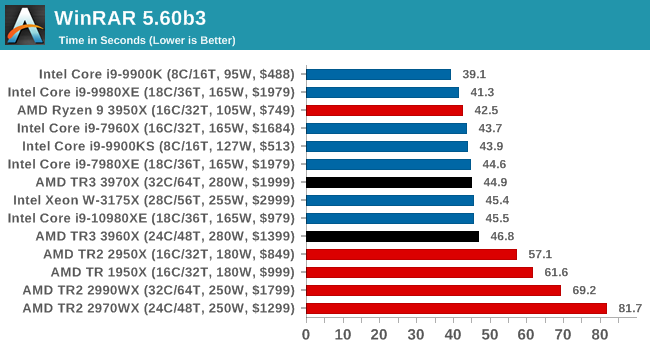
WinRAR is a variably threaded application, and both TR3 processors perform in the same ballpark as anything from Intel. Ideally we should have seen them streak ahead, but we seem to be at a point where CPU frequency or core counts are the limiting factor. At least with Zen 2, there are no issues as there was with Zen 1/Zen+.
AES Encryption: File Security
A number of platforms, particularly mobile devices, are now offering encryption by default with file systems in order to protect the contents. Windows based devices have these options as well, often applied by BitLocker or third-party software. In our AES encryption test, we used the discontinued TrueCrypt for its built-in benchmark, which tests several encryption algorithms directly in memory.
The data we take for this test is the combined AES encrypt/decrypt performance, measured in gigabytes per second. The software does use AES commands for processors that offer hardware selection, however not AVX-512.
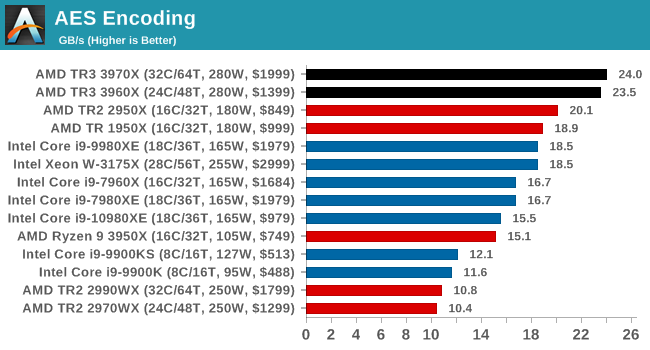










245 Comments
View All Comments
niva - Wednesday, November 27, 2019 - link
If that's how you feel just go to another website, why even bother posting here?stux - Monday, November 25, 2019 - link
I must admit I’m saddened by the lack of compiler benchmarks. Who cares about gaming benchmarks on a workstation processor.Meanwhile actually benchmarks which may affect serious purchasers are missing
ABR - Tuesday, November 26, 2019 - link
Another vote for compilation. Ability to take advantage of more cores is a complex equation depending on caching, i/o, and memory access, so it would be informative to see some comparisons done.Lux88 - Tuesday, November 26, 2019 - link
Another vote for compilation. Should be relatively easily scriptlable too. Linux kernel compiles under half a minute, but Chromium or Firefox should still be big enough. Additionally there's .NET, could be an interesting data point.GreenReaper - Tuesday, November 26, 2019 - link
PostgreSQL database work? It can parallelize quite nicely now, especially with PG12.PeachNCream - Tuesday, November 26, 2019 - link
Yup, one more +1 for compiler benchmarks and for the lack of relevance of gaming benchmarks.peevee - Tuesday, November 26, 2019 - link
Agree. Compiler, CADs etc must be here, games and self-made tests and useless PI calculators should not.Supercell99 - Tuesday, November 26, 2019 - link
Would like to see how it runs some VMware ESXi loads as well.cosecant - Tuesday, November 26, 2019 - link
Another vote for compilation, go or c++, as well as database tests, CAD of some kind, and virtualization (bonus points for docker or Kubernetes as well)... however... please don’t remove all the gaming benchmarks... I might be in the minority, but I like to be able to game or work on the same machine...Supercell99 - Tuesday, November 26, 2019 - link
Yea more HEDT testing applicable. Gaming on this chip is not the intent.